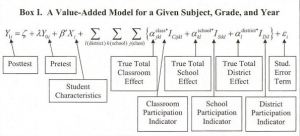"Value Added" Offers No Value for Education Reform

U.S. public education has been mired in a technocratic paradigm—a narrow pursuit of efficiency through metrics-based science—since the early 1900s (Kliebard, 1995; Kincheloe, Steinberg, & Hinchey, 1999). In recent years, the accountability era has shifted deeper into that technocratic hole, adding to school and student accountability based on high-stakes test the use of value added measures (VAM) for identifying teacher quality and reforming teacher accountability.
Often the debate about VAM rests on how (or how better) to implement VAM—not whether it is a legitimate process to address the key problems facing public education.
Stepping back from how to address if and why, Joe Kincheloe (Thomas & Kincheloe, 2006) envisions a different paradigm, postformalism:
"[P]ostformalists insist that educational psychologists and educators must avoid placing complex multidimensional problems of teaching and learning into simple psychological boxes and blaming the victims of socio-political forces. Postformalists point out that such reductionist approaches illustrate yet again the decontextualizing tendencies of too much of the psychological educational practices that find their way into schools, as they substitute individual remedies for larger social problems...."In the pathologizing and victim-blaming deficit model of contemporary educational
